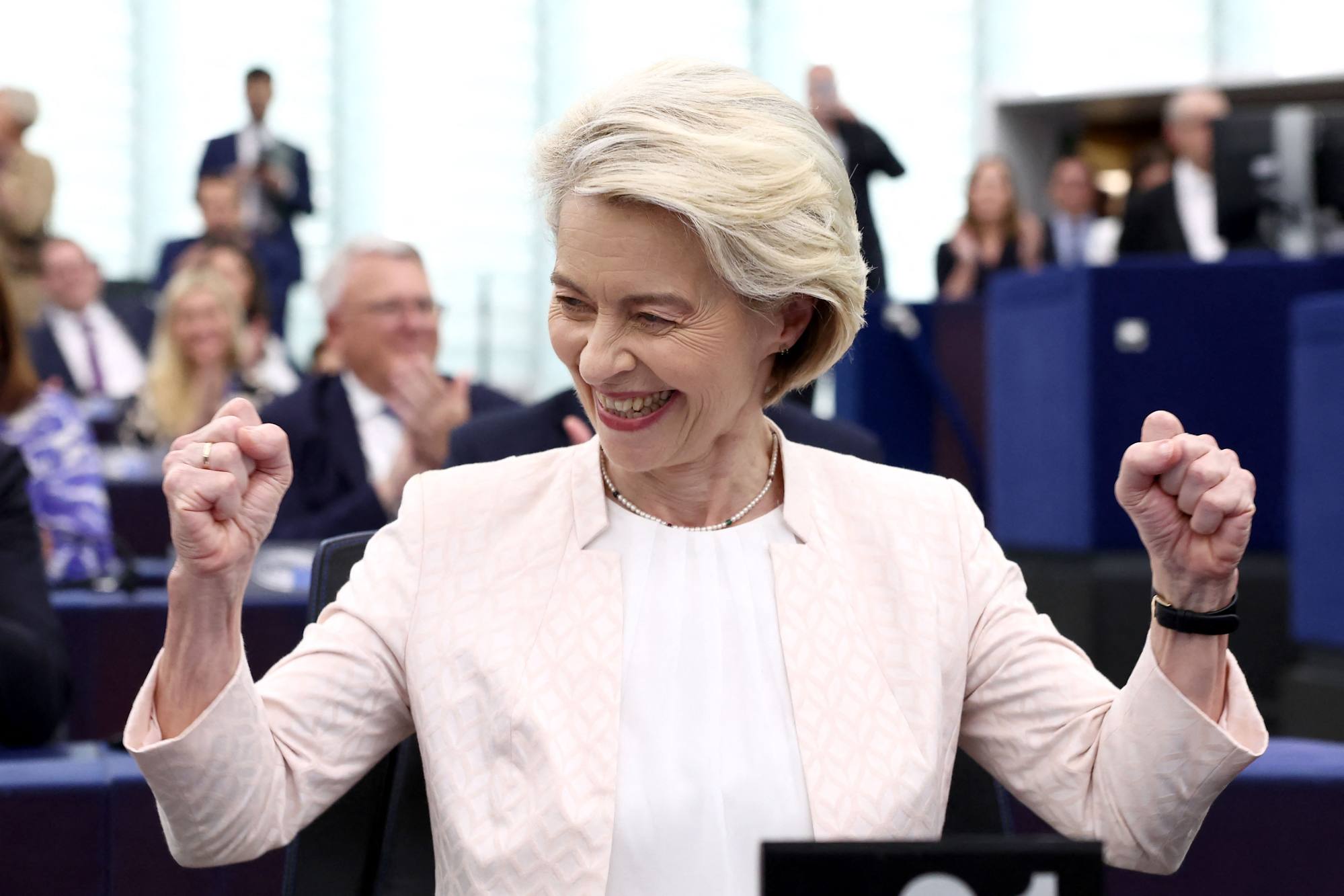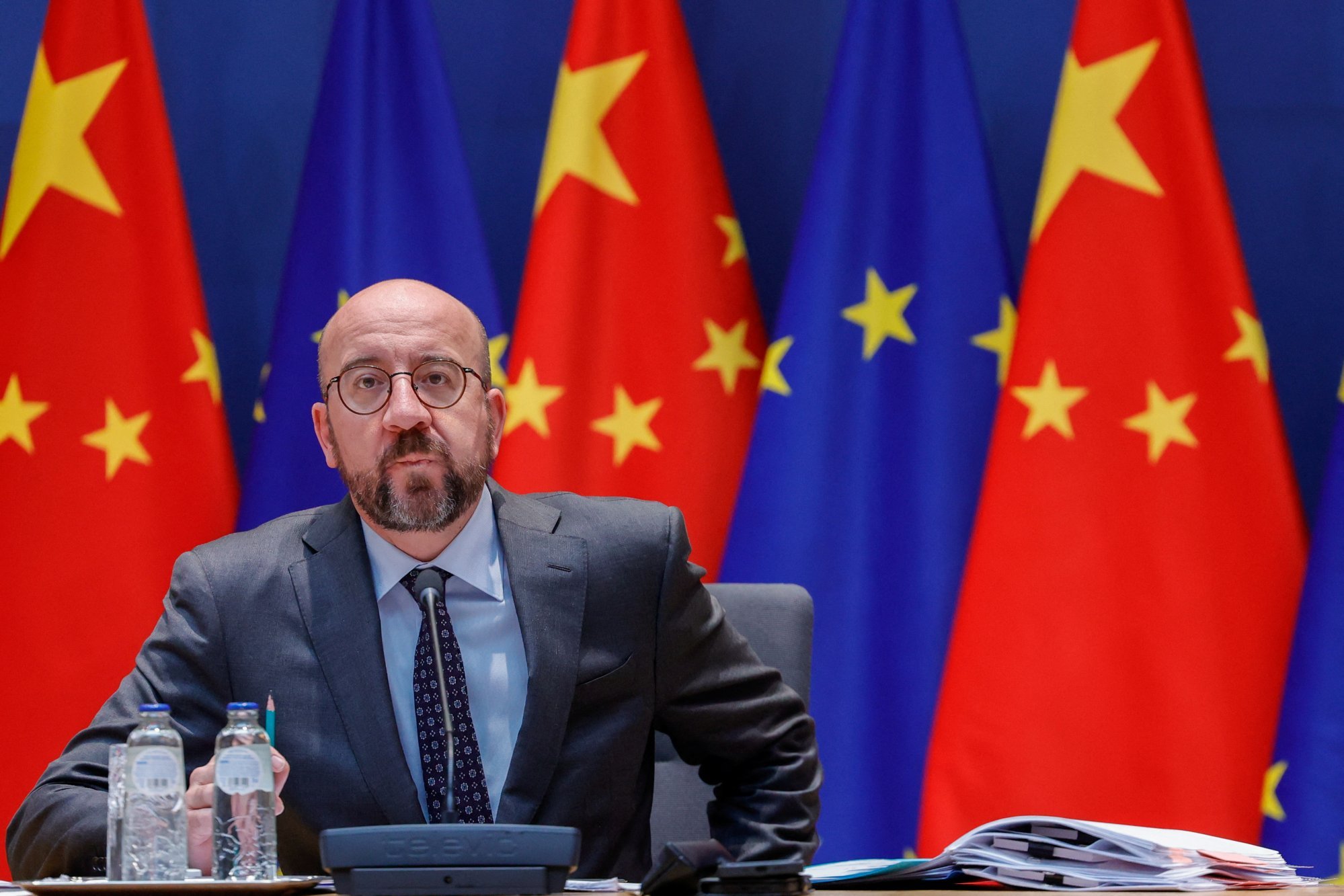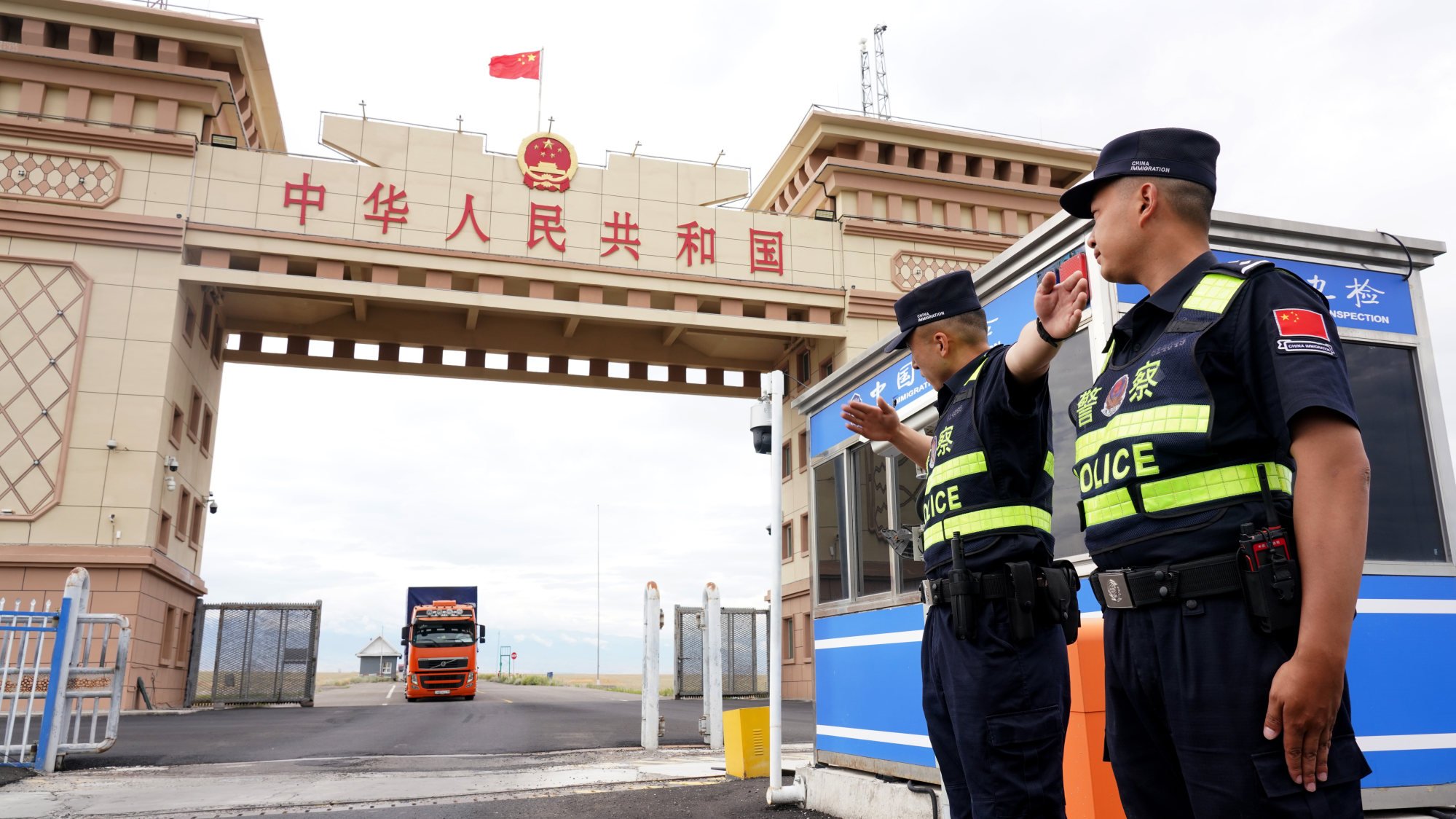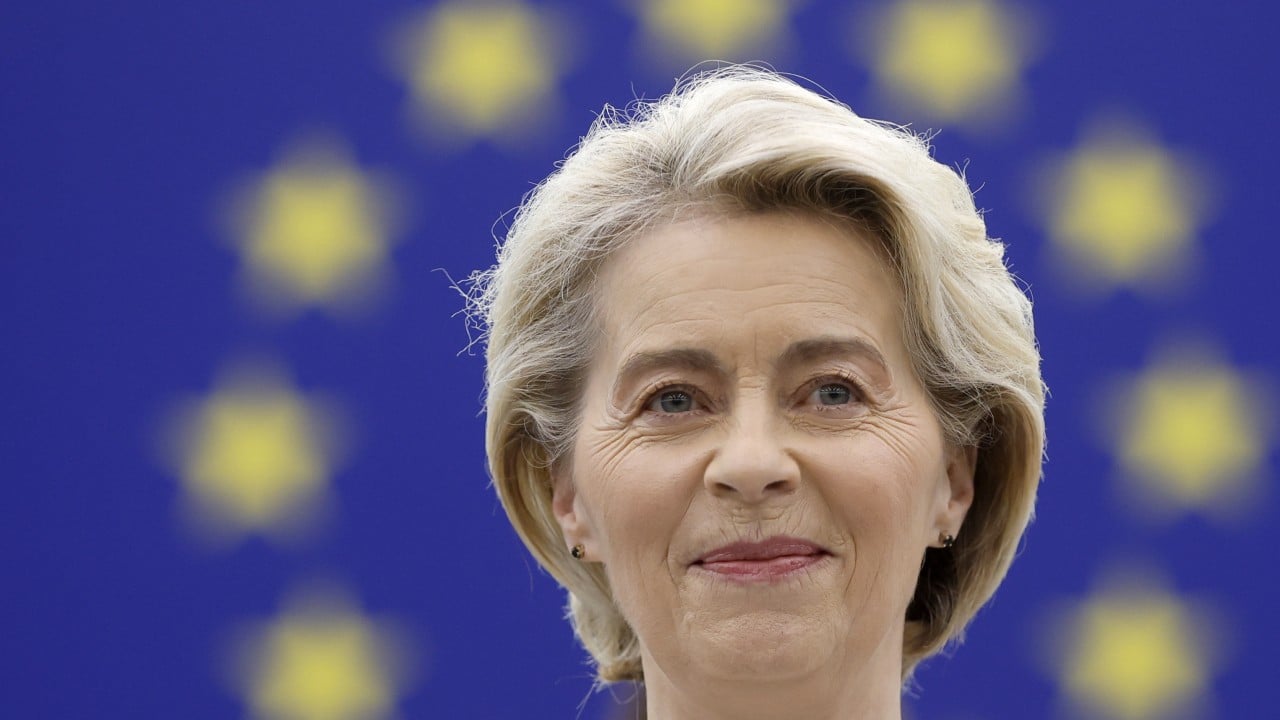During her first term, von der Leyen pursued a strategy of de-risking from Beijing and oversaw a blitz of investigations, cracking down on what she called “market-distorting” subsidies in China’s hi-tech and clean-tech spaces.

A manifesto released shortly before the vote suggested that the German was not for changing: for Beijing, von der Leyen 2.0 looks a lot like von der Leyen 1.0.
“The more aggressive posture and unfair economic competition from China, its ‘no-limits’ friendship with Russia – and the dynamics of its relationship with Europe – reflect a shift from cooperation to competition,” the manifesto read.
It promoted the ideas of geoeconomics and economic security, pledging to continue “de-risking rather than decoupling” with China.
“We must be more assertive in protecting our economy from key technology leakage and security concerns,” it continued. “This issue is particularly acute when dealing with those who are also strategic competitors and systemic rivals.”
The document pledged to bolster ties with Indo-Pacific allies, including Australia and India.
“This includes our collective efforts to deploy the full range of our combined statecraft to deter China from unilaterally changing the status quo by military means, particularly over Taiwan,” it said.
Von der Leyen will oversee a different Europe to the one she inherited in 2019. Her policy platform five years ago made no mention of China, nor even of Russia.
On Thursday, her pledges were dominated by references to security, defence and self-sufficiency.
Business figures noted that during a speech that ran to over 45 minutes, she did not once mention the word “trade”.
It was a reflection of how drastically ties with China have changed too.
In 2020, barely a year into her first term, a smiling von der Leyen signed an EU-China investment deal with Chinese President Xi Jinping and other leaders in an online ceremony that now seems like a snapshot of a parallel universe.
The coronavirus pandemic helped sour the mood in Europe towards Beijing, while a tit-for-tat barrage of sanctions in March 2021 effectively killed the investment pact.
China’s coercive response to Lithuania’s hosting of a controversially named Taiwanese government office further poisoned the well.
But it was Russia’s invasion of Ukraine in 2022, halfway through von der Leyen’s term, that led to a tectonic shift.
While China has professed neutrality in the armed conflict, most in Europe view Beijing as having backed Moscow rhetorically, diplomatically, and through the intensifying supply of dual-use goods that EU officials say are helping to “kill Ukrainians”.

The China-Russia nexus emboldened von der Leyen to push a sterner trade policy, arguing that Europe must not remain dependent on authoritarian states and that Beijing’s state subsidies were bankrupting European competitors.
The debate over overcapacity in China’s manufacturing economy reached fever pitch this year, with Brussels unleashing a deluge of probes against Chinese firms in sectors ranging from electric vehicles to wind turbines.
The trend is set to continue, with the third plenum of the Chinese Communist Party’s Central Committee, which ended on Thursday.
The body has signalled continued support for the country’s hi-tech sectors and opted not to telegraph major consumption-boosting measures that could absorb the capacity.
Bilateral adamance is pushing both sides closer to a trade war each passing month. Indeed, on Thursday the centre-right EU leader vowed to “use all of our trade defence instruments where and when needed”.
“Von der Leyen wants a new kind of economic foreign policy,” said Tobias Gehrke of the European Council on Foreign Relations, who described it as an “extension of what already took place in her current mandate”.
“Rather than banking everything on free-trade agreements, she wants the union to build economic security, trade and investment,” Gehrke added.
While the German’s intentions are obvious, various obstacles could stop her pursuing her China strategy to the extent she desires.
The American presidential election in November is the biggest unknown. A return of Donald Trump to the White House could jeopardise the close transatlantic ties that have seen the US and EU collaborate on some areas of China policy.
While US President Joe Biden has gently cajoled Brussels to follow a tougher line on Beijing, Trump is widely expected to wield stick over carrot. That could mean a more transactional alliance marked by tactical cooperation and strategic dissonance.
Furthermore, many EU member states remain unconvinced by von der Leyen’s proposed economic security strategy, the cornerstone of de-risking.
The strategy includes the screening of outbound investments for some hi-tech sectors into China as well as a European-wide export controls regime.
The commission was supposed to publish guidelines this summer on how the outbound policy would work, but unease in many capitals has kicked it to November. The Post understands that only one of the EU’s 27 member states – Lithuania – has backed the commission’s proposal.
Some members, von der Leyen’s Germany included, do not even have the legal right to monitor transactions by private businesses. Still others are loathe to hand the commission more powers.
“While there is much repetition of the EU’s economic security agenda, there are few suggestions on how to overcome the institutional deadlocks that have prevented greater advancements in areas where member states hold exclusive competences,” said Arthur Leichthammer of the Jacques Delors Centre in Berlin.
Personnel issues could also play a role.
In Brussels, von der Leyen has dominated the China space. In contrast, Charles Michel and Josep Borrell, the outgoing leaders of the European Council and External Action Service – its de facto foreign office – have been viewed as weak and deeply unpopular.

It remained to be seen whether incoming European Council boss Antonio Costa, the former Portuguese prime minister, would become a stronger rival than Michel or even a closer collaborator with the commission boss on the China file.
Costa’s appointment to chair the council – made up of the EU’s member states – has been a glimmer of hope for Beijing: during his nine years at the helm in Lisbon, he invited billions of euros in Chinese investment into the Portuguese economy.
Costa is also thought to personally know Cai Run, the incoming Chinese ambassador to the EU. Cai was Beijing’s envoy in Lisbon for five years of Costa’s tenure.
As for the expected next top diplomat, Estonian Prime Minister Kaja Kallas, she is unlikely to disagree with von der Leyen’s assessment of Beijing, particularly if China continues to enjoy close ties with Moscow.
One senior source said the German must learn to build bridges with both institutions, otherwise her de-risking plans will go nowhere. “Without the support of member states, there is only so much she can do,” they said.
The EU’s most powerful members, meanwhile, face a moment of political vulnerability, leading one diplomat to suggest that the commission could “move to further fill the power void”.
In Paris, French President Emmanuel Macron’s recent electoral gambit left his party politically hobbled. In Germany, Chancellor Olaf Scholz is struggling to corral a noisy and disjointed coalition towards next year’s federal election.
In the now right-leaning parliament, von der Leyen will face resistance against excessive red tape but widespread support for a tougher stance on China.
Sources said Engin Eroglu, a centrist German lawmaker who has championed Uygur rights in the chamber, is expected to lead its next China delegation.

Now, a college of commissioners must be appointed, with capitals set to scrap over juicy China-facing portfolios like trade and competition.
Hearings in the autumn could see nominees hauled over the coals by lawmakers for their stances towards Beijing, while a bellwether for the next five years will come in November, by which point the new commission should be in place.
This is when capitals must vote on whether to adopt provisional duties on Chinese-made electric vehicles on a permanent basis.
An indicative vote this week saw just four members vote against tariffs, but vocal opponents such as Germany and Sweden abstained in the hope that the commission could reach a negotiated settlement with Beijing.
“Von der Leyen will continue to drive the China agenda,” said Noah Barkin, an EU-China expert at Rhodium Group.
“Member states can push back on certain areas, but this fundamental shift in the relationship, triggered by the worsening trade relationship and by China’s support for Russia, I don’t see that changing.”

